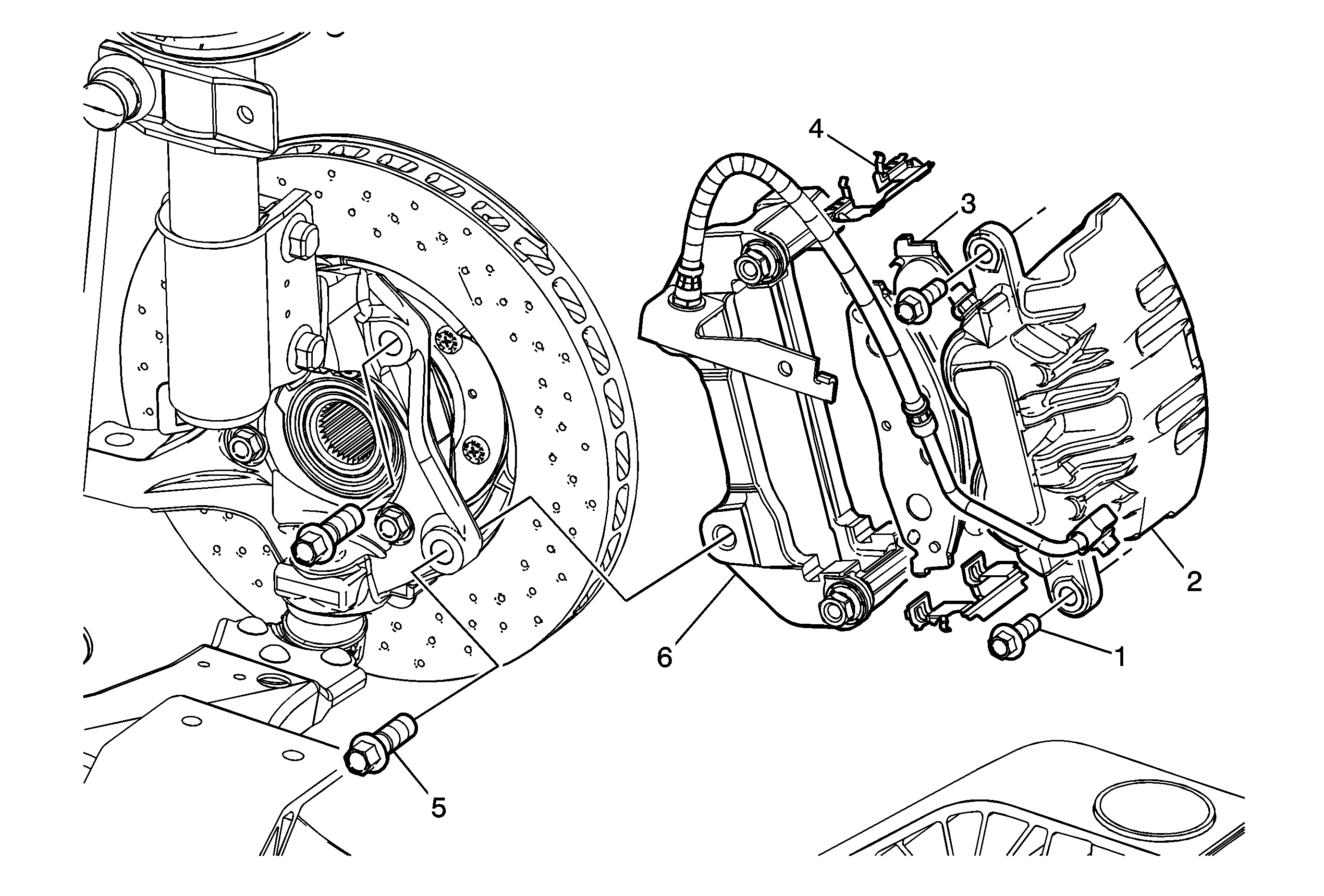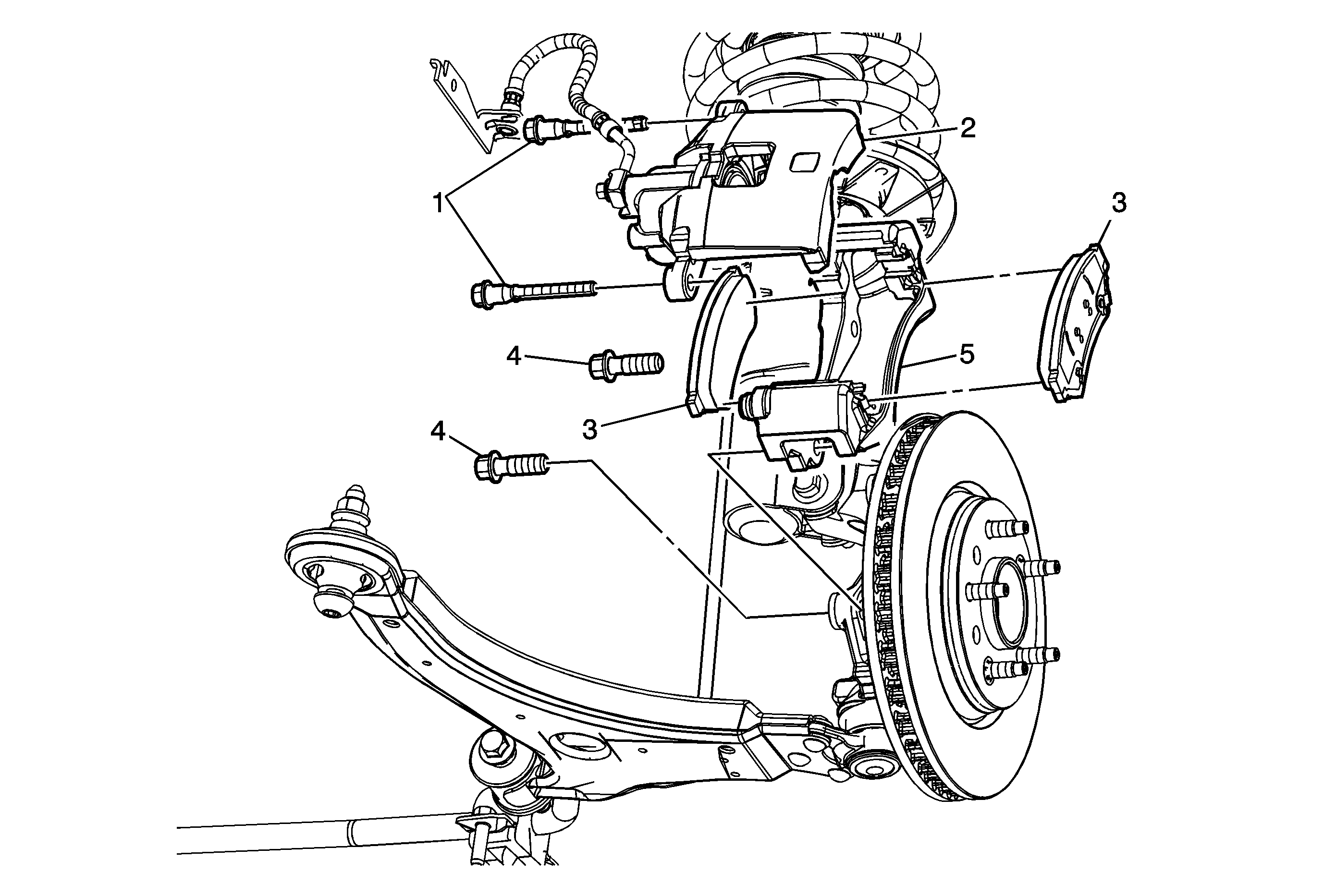Callout
| Component Name
|
|
Caution: Refer to Brake Dust Caution in the Preface section.
Notice: Support the brake caliper with heavy mechanic wire, or equivalent,
whenever it is separated from its mount and the hydraulic flexible brake hose is still connected. Failure to support the caliper in this manner will cause the flexible brake hose to bear the weight of the caliper, which may cause damage to the brake hose and
in turn may cause a brake fluid leak.
Preliminary Procedures
- Raise and support the vehicle. Refer to
Lifting and Jacking the Vehicle
.
- Remove the tire and wheel. Refer to
Tire and Wheel Removal and Installation
.
|
1
| Brake Caliper Guide Pin Bolt (Qty: 2)
Notice: Refer to Fastener Notice in the Preface section.
Tighten
60 N·m (44 lb ft) |
2
| Brake Caliper
ProcedurePosition the brake caliper aside and support with heavy mechanics wire or equivalent.
|
3
| Disc Brake Pads
|
4
| Brake Pad Spring Retainer (Qty: 2)
|
5
| Brake Caliper Bracket Bolt (Qty: 2)
Tighten
185 N·m (136 lb ft) |
6
| Brake Caliper Bracket
Procedure
- Prepare the bolts and the threaded holes for assembly.
- Thoroughly clean the residue from the fastener threads using denatured alcohol or equivalent and allow to dry.
- Thoroughly clean the residue from the threaded holes using denatured alcohol or equivalent and allow to dry.
- If reusing the old caliper bracket bolts, apply threadlocker GM P/N 12345493 (Canadian P/N 10953488), or equivalent to 2/3 of the threaded length of the fastener. Ensure that there are no gaps in the
threadlocker along the length of the filled area of the fastener.
- Allow the threadlocker to cure approximately ten minutes before installation.
Tip
The caliper bracket bolts threads and the threaded holes of the caliper bracket must be free of threadlocker residue and debris prior to re-application of threadlocker in order to ensure proper adhesion and fastener retention. |
Callout
| Component Name
|
|
Caution: Refer to Brake Dust Caution in the Preface section.
Notice: Support the brake caliper with heavy mechanic wire, or equivalent,
whenever it is separated from its mount and the hydraulic flexible brake hose is still connected. Failure to support the caliper in this manner will cause the flexible brake hose to bear the weight of the caliper, which may cause damage to the brake hose and
in turn may cause a brake fluid leak.
Preliminary Procedures
- Raise and support the vehicle. Refer to
Lifting and Jacking the Vehicle
.
- Remove the tire and wheel. Refer to
Tire and Wheel Removal and Installation
.
|
1
| Brake Caliper Guide Pin Bolt (Qty: 2)
Notice: Refer to Fastener Notice in the Preface section.
Procedure
- Note the location of the brake caliper guide pin bolts. The upper guide pin bolt is equipped with a bushing and must be installed in the same location.
- Clean the guide pin bolts with denatured alcohol and a clean cloth.
- Apply a thin coat of high temperature silicone brake lubricant to the brake caliper guide pin bolt and the brake caliper bracket bore.
Tighten
95 N·m (70 lb ft) |
2
| Brake Caliper
ProcedurePosition the brake caliper aside and support with heavy mechanics wire or equivalent.
|
3
| Disc Brake Pad
ProcedureIf replacing the brake pads, discard the brake pad shims. Install NEW shims.
|
4
| Brake Caliper Bracket Bolt (Qty: 2)
Tighten
180 N·m (133 lb ft) |
5
| Brake Caliper Bracket
Procedure
- Prepare the bolts and the threaded holes for assembly.
- Thoroughly clean the residue from the fastener threads using denatured alcohol or equivalent and allow to dry.
- Thoroughly clean the residue from the threaded holes using denatured alcohol or equivalent and allow to dry.
- If reusing the old caliper bracket bolts, apply threadlocker GM P/N 12345493 (Canadian P/N 10953488), or equivalent to 2/3 of the threaded length of the fastener. Ensure that there are no gaps in the threadlocker
along the length of the filled area of the fastener.
- Allow the threadlocker to cure approximately 10 minutes before installation.
Tip
The caliper bracket bolts threads and the threaded holes of the caliper bracket must be free of threadlocker residue and debris prior to re-application of threadlocker in order to ensure proper adhesion and fastener retention. |


